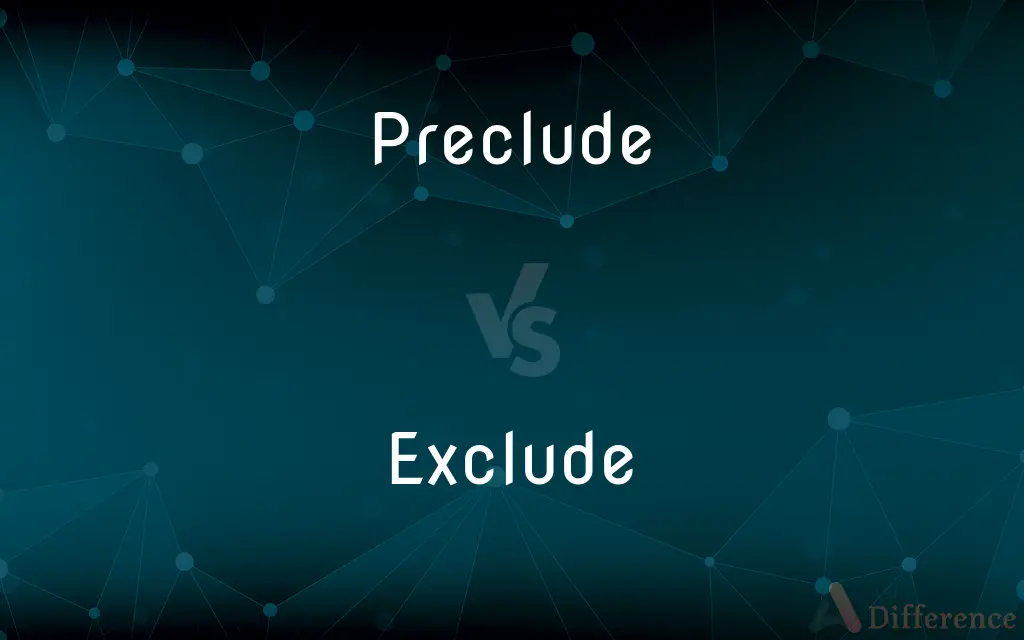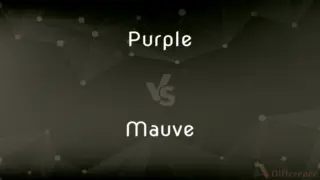Preclude vs. Exclude — What's the Difference?
By Tayyaba Rehman — Updated on October 4, 2023
Preclude means to prevent something or make it impossible, while Exclude means to deliberately leave out or not include something.

Difference Between Preclude and Exclude
Table of Contents
ADVERTISEMENT
Key Differences
Preclude and Exclude are two terms that, while related, differ in their specific applications. To preclude is to prevent the possibility of an event or action from occurring, often in advance. It has a proactive connotation. On the other hand, to exclude is to intentionally leave out or bar something or someone from a particular group or activity.
The term Preclude often implies an action taken in anticipation. It emphasizes prevention. For example, security measures can preclude the possibility of a breach. In contrast, Exclude emphasizes the act of omission, often after considering all possibilities or options. For instance, a person can be excluded from a guest list.
From a grammatical perspective, both Preclude and Exclude are verbs. However, their usage can vary based on context. When someone says an action precludes another, it means the first action prevents the second from happening. When someone excludes an item, they're deliberately leaving it out or not including it.
One can think of Preclude as dealing more with potential futures or possibilities, while Exclude deals more with present decisions or situations. For example, a lack of qualification might preclude someone from getting a particular job. However, if a person isn’t selected for a role because of not meeting the criteria, they are excluded from the position.
In summary, while Preclude and Exclude both denote prevention or omission, they differ in the timing and intent behind their usage. Preclude involves preventing something in advance, while Exclude focuses on a deliberate act of leaving out.
ADVERTISEMENT
Comparison Chart
Primary Meaning
Prevent from happening
Deliberately leave out
Timing
Often anticipatory
Typically present or after-the-fact
Connotation
Proactive prevention
Act of omission
Example Usage
"His injury precluded him from playing."
"She was excluded from the team."
Focus
On potential futures or possibilities
On present decisions or situations
Compare with Definitions
Preclude
Prevent from happening.
The rain precluded our plans for a picnic.
Exclude
Deliberately not provide.
The insurance policy excludes certain conditions.
Preclude
Stop something from being considered.
The evidence precludes any other interpretation.
Exclude
Leave out of consideration.
Certain items were excluded from the list.
Preclude
Eliminate the possibility of.
His contract precludes him from negotiating with other teams.
Exclude
Prevent from entering; keep out.
Pets are excluded from the restaurant.
Preclude
Make impossible.
His tight schedule precluded any chance of a break.
Exclude
Remove from a set or group.
The outlier was excluded from the data set.
Preclude
Rule out in advance.
Her prior commitments precluded her attendance.
Exclude
Deny (someone) access to a place, group, or privilege
The public were excluded from the board meeting
Preclude
(transitive) Remove the possibility of; rule out; prevent or exclude; to make impossible.
It has been raining for days, but that doesn’t preclude the possibility that the skies will clear by this afternoon!
Exclude
Remove from consideration
One cannot exclude the possibility of a fall in house prices
Preclude
Prevent from happening; make impossible
The secret nature of his work precluded official recognition
Exclude
To prevent from entering; keep out; bar
A jar sealed to exclude outside air.
An immigration policy that excludes undesirables.
Preclude
To make impossible, as by action taken in advance; prevent.
Exclude
To prevent from being included, considered, or accepted; reject
The court excluded the improperly obtained evidence.
Preclude
To exclude or prevent (someone) from a given condition or activity
Modesty precludes me from accepting the honor.
Exclude
To put out; expel.
Preclude
To put a barrier before; hence, to shut out; to hinder; to stop; to impede.
The valves preclude the blood from entering the veins.
Exclude
(transitive) To bar (someone or something) from entering; to keep out.
Preclude
To shut out by anticipative action; to prevent or hinder by necessary consequence or implication; to deter action of, access to, employment of, etc.; to render ineffectual; to obviate by anticipation.
This much will obviate and preclude the objections.
Exclude
(transitive) To expel; to put out.
To exclude young animals from the womb or from eggs
Preclude
Keep from happening or arising; have the effect of preventing;
My sense of tact forbids an honest answer
Exclude
(transitive) To omit from consideration.
Count from 1 to 30, but exclude the prime numbers.
Preclude
Make impossible, especially beforehand
Exclude
To refuse to accept (evidence) as valid.
Exclude
To eliminate from diagnostic consideration.
Exclude
To shut out; to hinder from entrance or admission; to debar from participation or enjoyment; to deprive of; to except; - the opposite to admit; as, to exclude a crowd from a room or house; to exclude the light; to exclude one nation from the ports of another; to exclude a taxpayer from the privilege of voting.
And none but such, from mercy I exclude.
Exclude
To thrust out or eject; to expel; as, to exclude young animals from the womb or from eggs.
Exclude
Prevent from being included or considered or accepted;
The bad results were excluded from the report
Leave off the top piece
Exclude
Prevent from entering; shut out;
The trees were shutting out all sunlight
This policy excludes people who have a criminal record from entering the country
Exclude
Lack or fail to include;
The cost for the trip excludes food and beverages
Exclude
Prevent from entering; keep out;
He was barred from membership in the club
Exclude
Put out or expel from a place;
The child was expelled from the classroom
Exclude
Bar from participation.
He was excluded from the meeting.
Common Curiosities
Is preclude always about future events?
Typically, yes. Preclude often refers to preventing future possibilities.
Why would someone be precluded from an event?
They might be precluded due to a rule, a previous commitment, or other preventative factors.
Can preclude and exclude be used interchangeably?
No, while related, they have distinct meanings and are not always interchangeable.
Which is stronger, preclude or exclude?
Neither is inherently stronger, but "preclude" suggests proactive prevention, while "exclude" implies a decision to leave out.
Is "exclude" only used for people?
No, "exclude" can be used for objects, ideas, options, or any item not included in a particular group or setting.
Can an argument be precluded?
Yes, if evidence or facts prevent that argument from being considered valid.
Can "exclude" mean to not include by mistake?
Typically, "exclude" implies deliberate omission, but context can sometimes suggest an unintentional oversight.
Does excluding always mean deliberately leaving out?
Typically, yes. "Exclude" often implies a conscious decision to leave something out.
What does it mean to preclude an event?
To preclude an event means to prevent it from happening.
What's the opposite of exclude?
Include.
Is preclusion a noun form of preclude?
Yes, preclusion refers to the act or state of preventing or excluding.
Which word is about prevention, and which one is about omission?
"Preclude" is about prevention, and "exclude" is about omission.
Can preclude be used in legal contexts?
Yes, it's often used to indicate something that's prevented by law or evidence.
Can a person be precluded from a right or privilege?
Yes, certain conditions or actions can prevent or bar a person from a specific right or privilege.
Is there a noun form of "exclude"?
Yes, the noun form is "exclusion."
Share Your Discovery

Previous Comparison
Fuschia vs. Magenta
Next Comparison
Purple vs. MauveAuthor Spotlight
Written by
Tayyaba RehmanTayyaba Rehman is a distinguished writer, currently serving as a primary contributor to askdifference.com. As a researcher in semantics and etymology, Tayyaba's passion for the complexity of languages and their distinctions has found a perfect home on the platform. Tayyaba delves into the intricacies of language, distinguishing between commonly confused words and phrases, thereby providing clarity for readers worldwide.














































